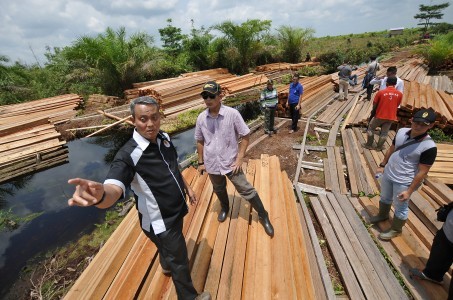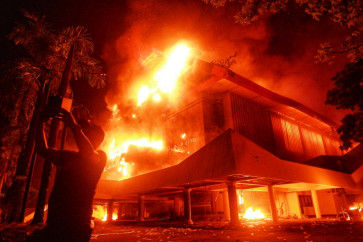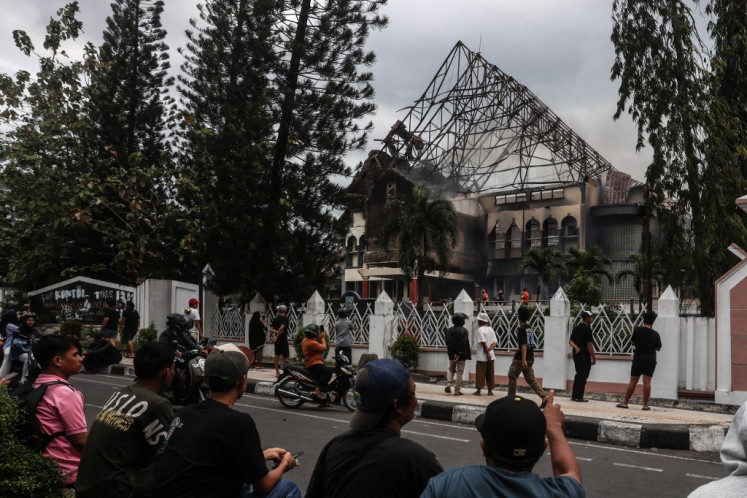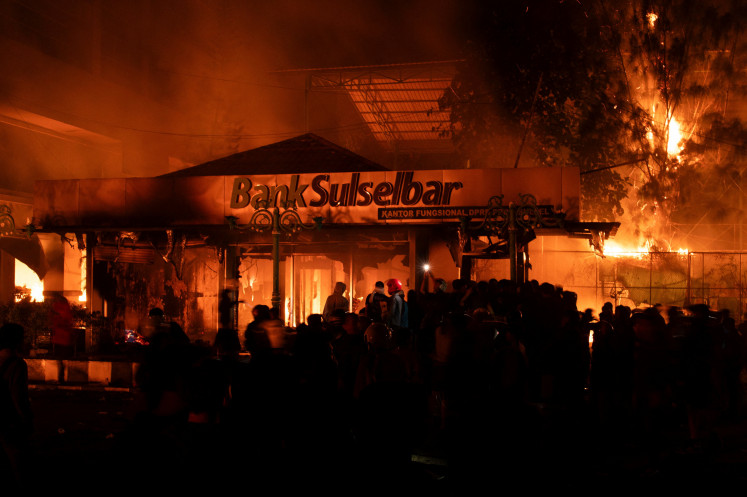Popular Reads
Top Results
Can't find what you're looking for?
View all search resultsPopular Reads
Top Results
Can't find what you're looking for?
View all search resultsFatal floods blamed on deforestation in Indonesia
Rampant illegal logging and the conversion of protected forests around the upstream area of the Batang Ayumi River are being blamed for flash floods that left five people dead in Padang Sidempuan regency, North Sumatra.
Change text size
Gift Premium Articles
to Anyone
 The chief of Garuda Putih Military Resort Command Col. Inf. Refrizal (second left) and the Jambi Forestry Agency's Forest Protection Division head Ahmad Bestari (left) along with members of Forest and Land Fires task force have a discussion at the location where they found illegal timber in a concession area of a company in Muaro Jambi regency in Jambi on Saturday, March 18. (Antara/Wahdi Septiawan)
The chief of Garuda Putih Military Resort Command Col. Inf. Refrizal (second left) and the Jambi Forestry Agency's Forest Protection Division head Ahmad Bestari (left) along with members of Forest and Land Fires task force have a discussion at the location where they found illegal timber in a concession area of a company in Muaro Jambi regency in Jambi on Saturday, March 18. (Antara/Wahdi Septiawan)
Rampant illegal logging and the conversion of protected forests around the upstream area of the Batang Ayumi River are being blamed for flash floods that left five people dead in Padang Sidempuan regency, North Sumatra.
The director of the Indonesian Forum for the Environment (Walhi) in North Sumatra, Dana Prima Tarigan, said protected forests in Marancar, South Tapanuli regency, were in a critical condition because of illegal logging and land-conversion activities.
As a result the barren land can no longer accommodate a high water debit during heavy downpours, quite apart from the poor condition of the Batang Ayumi River caused by sedimentation.
“That’s why the flash floods hit people’s houses along with mud and logs,” Dana told The Jakarta Post on Tuesday.
Dana said flash flooding triggered by forest damage was very dangerous because it was usually accompanied by mud and logs capable of devastating a village and dragging victims to their death.
Five people were reported to have died in the flash floods on Sunday while four others were injured. The floods hit five subdistricts in Padang Sidempuan, with Batunadua Julu the worst hit. The financial cost of the floods was estimated at Rp 4.5 billion (US$338,300).
Dana blamed local administrations for not providing people with warnings during heavy rains, especially considering the critical condition of the forests in the upstream area.
Syamsir, 32, of Lubuk Raya subdistrict said the flash floods hit his region at 7 p.m. on Sunday, following heavy rain since 5 p.m. the same day. “We promptly fled our home. None of our belongings could be saved. Everything was carried away by the flood,” he said.
North Sumatra Police spokesperson Sr. Comr. Rina Sari Ginting said her office would set up a special team to investigate the cause of the flash floods in Padang Sidempuan, including the forest damage in the river’s upstream area.
In West Sumatra, hundreds of houses and a number of public facilities in three regions of Sijunjung regency, Solok regency and Solok city were inundated in floodwater up to 1 meter deep on Tuesday following heavy rain since 11 p.m. on Monday.
West Sumatra Disaster Mitigation Agency’s (BPBD West Sumatra) emergency and logistic division head R. Pagar Negara said the flood hit five districts in Sijunjung and two each in Solok regency and city.
“No fatalities have been reported so far. The situation is secured and officers from the BPBD, Social Affairs Agency and the Indonesian Red Cross have been deployed to the affected areas,” Pagar said.
Flash floods were also reported to have hit Bima city in West Nusa Tenggara (NTB) on Sunday afternoon following heavy downpours over the region.
BPBD West Nusa Tenggara recorded that the flooding affected at least 22 subdistricts in five districts in the city, forcing over 2,500 people to flee their homes.
BPBD West Nusa Tenggara head Muhammad Rum said heavy rain started to fall over the city at 3:30 p.m. on Sunday and stopped only at 11:30 p.m. that night. The high rainfall caused the city’s main rivers of Padolo and Salo to overflow and flooded nearby housing complexes and agricultural land.
“Residents were taken to safer places such as mosques, school buildings and the city hall,” said Rum.









